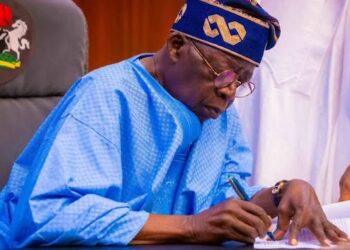The Independent National Electoral Commission (INEC) has cautioned political parties against early open campaigns for the 2027 General Election, describing it as a violation of the Electoral Act.
However, human rights lawyer and Senior Advocate of Nigeria (SAN), Femi Falana, has condemned the ongoing political campaigns ahead of the 2027 general election, describing them as illegal, diversionary, and a breach of the Electoral Act, 2022.
Speaking in an interview, Falana called on INEC to caution politicians who are already engaging in premature electioneering, in violation of existing electoral laws.
“As far as the Electoral Act, 2022 is concerned, the ongoing election campaign is illegal, totally illegal,” he said.
“It’s also diversionary, because what Nigerians expect now, and what the law provides, is governance of the country without disruption. So it’s not time yet to campaign and I do hope that INEC would draw the attention of politicians, including those in government, to relevant provisions of the Electoral Act.”
Hut, the Chief Press Secretary to INEC Chairman, Mr Rotimi Oyekanmi, in an interview with NAN in Abuja, while responding to a question about the current subtle campaigns and printing of posters going on in the country ahead of the 2027 General Election advised politiciansto be fuided bynthe provisions of the law.
He said INEC was yet to release a timetable for the election.
”Open campaigns are allowed before 150 days before polling day and must end 24 hours prior to that day.
“INEC has not released the timetable and schedule of activities for the 2027 General Elections. To that extent, party primaries have not been held, and no political party has nominated candidates for the next general election.
“Section 94(1) of the Electoral Act 2022 stipulates that the period of campaigning in public by political parties for an election shall begin 150 days before polling day and end 24 hours prior to that day.
“Section 95 (1) of the Act also states clearly that a candidate and his or her party shall campaign for an election in accordance with such rules and regulations as may be determined by INEC,” he said.
The press secretary said that while Nigerians have the right and liberty to engage in political discussions and express their views on the next general election, any open campaign or canvassing for votes for the 2027 general election was not only inappropriate but a violation of the Electoral Act.
He drew the attention of all political parties in Nigeria to the situation at the commission’s last quarterly consultative meeting, adding that INEC expects full compliance with the law.
Galana, on jis part insisted that the law does not permit campaigns two years ahead of a general election, and any such activity must be halted unless the law is amended.
“There is no provision yet. There is no room yet for campaigning in Nigeria. Two years ahead of an election, it’s not part of our law. If those in power want to amend the law, that should be done,” Falana said.
The prominent lawyer also called on the media to resist amplifying identity-based political rhetoric, urging a focus on issues instead.
“The media must also help Nigerians by ensuring that when the time for campaigns comes, politicians are taken out of the cocoon of ethnicity, religion, and other primordial considerations.”
Falana stressed that politicians, whether in government or opposition, must prioritise addressing the country’s challenges over engaging in premature politicking.
“If you say you want to replace those in power, what is your solution to the electricity crisis, the crisis in the education system, the bad roads, and other problems confronting Nigeria?” he asked.
He further reminded those in power that governance—not campaigning—must be their immediate focus, in line with the law.
“When is the government going to govern the country? And that is why the law has set out when election campaigns will start, when they can end. It cannot be a business of four years,” he said.
Rejecting ongoing conversations around zoning and power rotation, Falana described such calls as a distraction from Nigeria’s real issues.
“You insult Nigerians when you hand over the politics of the country to a few people to decide who should govern, for how many years, which side of the country or which religious group should rule,” he said.
“For goodness’ sake, can we address the problems confronting the country and embrace those who have solutions?”
He concluded by reminding political parties and public officials of their constitutional obligations, including adherence to national policy objectives and the protection of citizens’ welfare and security.












